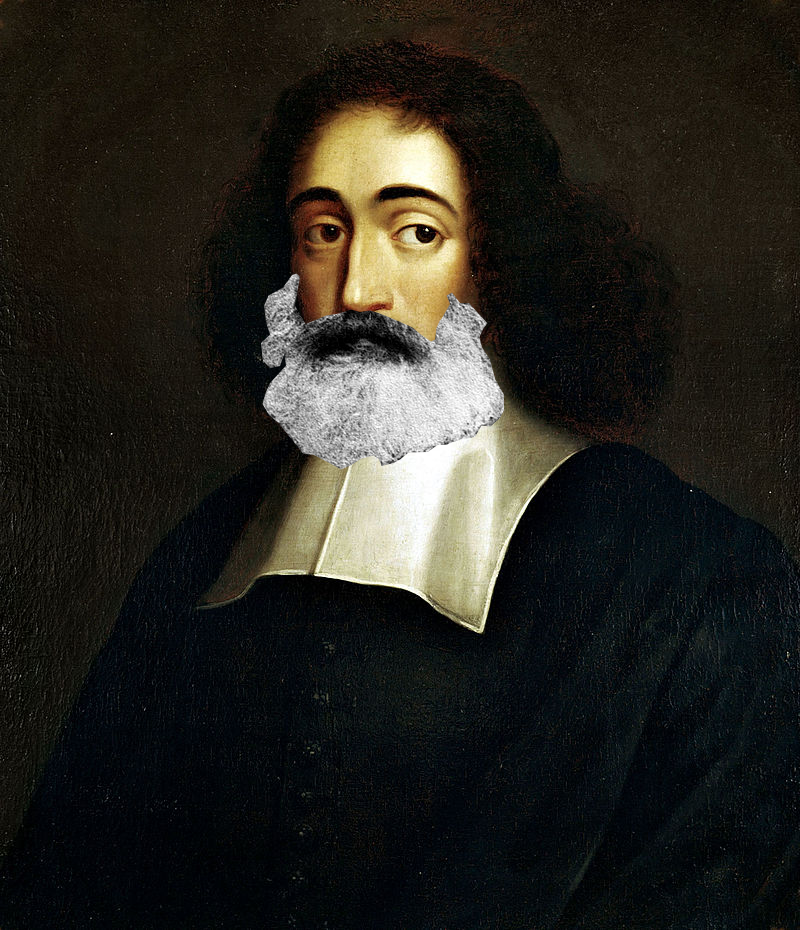Author: Sam Thomas
“[P]resent-day materialism is a Spinozism that has become more or less aware of itself.”[i]
Introduction
The purpose of this essay is to analyze the effect Spinoza’s insights have had on Marxism. Thus, it will ignore similar but unrelated questions. It will not analyze the current of thinkers who came after Marx’s death who drew upon both Spinoza and Marx to form a new line of thought. This paper will not touch on the personal lives of the two men. The fact that Spinoza was a lens grinder or that Marx was a newspaper editor does not affect the argument. This paper will not touch on the points of difference between the two. The fact that two thinkers differ on a certain point does not entail that one cannot have influenced the other.
Marxism, Philosophy, and “Marxism and Philosophy”
“Soviet philosophers have sometimes described Marx as ‘Spinoza with a beard’.”[ii]
As Korsch notes in “Marxism and Philosophy”, there is a tendency among socialists to try to divorce Marxism from its philosophical foundations.[iii] The Second International, with Hilferding and Kautsky, pioneered this cleaving. As Korsch further argues, this is a foolish pursuit. Philosophy and Marxism are so intertwined that to try to separate Marx from his philosophical foundations reduces his thought to mere sophistry and illusion. Korsch calls for both socialists and bourgeois academics to acknowledge the philosophical foundations of Marxism. His acknowledgement focuses on Hegel and other Hegelians as the prime influences on Marx. There is a Hegelian influence on Marx’s work. “The Holy Family” and “The German Ideology” are polemics against contemporaries of Marx who drew from Hegel to form their own radical ideas. Yet this narrow focus on Hegel and Hegelians obscures the influence that other thinkers had on Marx. As a consequence, Marxists misinterpret arguments because they shoehorn in Hegelian thought in cases where it is not pertinent.
Spinoza had, at least, an indirect influence on Marx. Hegel had a direct influence on Marx, and Spinoza had a direct influence on Hegel. Hegel lauded Spinoza, dedicating an entire chapter of the History of Philosophy to Spinoza’s thought.[iv] There is still a decent and interesting case that Spinoza had a more direct philosophical impact upon Marx.
Free Will and Causality
“Men make their own history, but they do not make it as they please; they do not make it under self-selected circumstances, but under circumstances existing already, given and transmitted from the past. The tradition of all dead generations weighs like a nightmare on the brains of the living.”[v]
Thus begins the second paragraph of The Eighteenth Brumaire. The paragraph references Hegel’s conception of history. For Hegel, the World-Historical Individual is an individual with unyielding motivation to make his mark on the world.[vi] This individual acts out the unconscious actualization of the World Spirit of freedom. He makes the world freer through his actions, but he is free to choose his actions. Men drive the world to become freer; they choose to change it. The specificities of the conditions in which these men live do not matter, except as a backdrop, for Hegel. What is important to Hegel is the inevitable march of history from servitude towards freedom, and the individuals that make that march happen.
Marx, the supposed Hegelian, does not agree with Hegel on this point. No one is free to paint the world in one’s image. The much discussed, but seldom defined “material conditions” of the world restrict possible ways in which someone may change it. While it may be fine for one to wish to change the world, the history that leads one to that change has an impact on how the change appears. The 1848 Revolution in France, for example, mimics the French Revolution because it had no other means by which it could actualize itself. The individual men in the situations are expendable. When Marx says “Caussidière for Danton, Louis Blanc for Robespierre, the Montagne of 1848 to 1851 for the Montagne of 1793 to 1795, the nephew for the uncle”[vii], he is talking about how the specific individuals in the two revolutions were less important as individuals and more important as people who performed a certain role in the development of the revolution.
Free will for Marx is thus less of a consideration than it is for Hegel. Where Marx does mention it in the Eighteenth Brumaire, he mentions it as a less potent and capable force than Hegel considered it. The mystery, then, is where an alleged Hegelian got a distinct non-Hegelian influence on free will.
In Ethics, Spinoza claims that “[t]he will cannot be called a free cause, but only a necessary one.”[viii] Spinoza denies that free will exists, since there is nothing contingent in the universe.[ix] Spinoza’s argument against free will contradicts Hegel’s view of history. People are not free to choose to do what they please, but rather the long string of causality leading to the present choice determines the action. It thus makes no sense for there to be a World-Historical Individual who is free to do what he will, and in the process, make the world freer. He is not acting free from restraint. Rather, he is choosing an action based on the present historical situation. What was a mere backdrop for Hegel, the specific historical conditions, becomes of prime importance to Spinoza.
There are three objections to the argument that Spinoza influenced Marx’s view of history and causality. First, the view of causality and free will Spinoza has contradicts Marx’s. Spinoza viewed causality as a sort of eternal chain that goes back to God.[x] This is proof that the will is not free. But Spinoza relies on the existence of God as a premise in his argument; Spinoza’s God is always in all things and.[xi] Yet Marx, an atheist, does not deny that “men make their own history”.[xii]
This objection does not understand the nature of God, for Spinoza. The Spinozist God is not like the personified God of Christianity and Judaism. Rather, God exists as an entity that lacks and desires nothing, and thus needs no praise or worship.[xiii] God is a substance, or self-causing entity, that expresses an infinite amount of attributes, or ways that an intellect of a substance perceives as its essence.[xiv] The nature of Spinoza’s God is so unique that some even thought Spinoza was an atheist.[xv] The objection that the two men had differing religious views does not stand since the idiosyncratic definition of God Spinoza gives does not bar an atheist from affirming the argument.
On the part of the objection that states that since Spinoza’s view of free will was different than the Marxist view, Spinoza himself argues a sort of Marxist view of free will later in the Ethics. Much of Ethics has an instructive style to it; Spinoza advises the reader to do or be a certain way.[xvi] Yet if there is no free will, then this advice makes no sense. Why tell someone to do something if causality has determined their choice in advance? Both argue that men do not make history as they please, but only under certain circumstances[xvii]. Both call into doubt the extent of their causal determination. The objection falls.
The second objection states that since others before Spinoza have argued against the existence of free will, then it is uncertain that Spinoza’s views in particular influenced Marx’s views on causality and free will. Arguments against free will on causal grounds have existed for centuries. Spinoza was neither the first nor the last person to argue against free will in that manner. It is thus impossible to tell who influenced Marx’s views of free will and causality.
This second objection fails to understand the nuance of Spinoza’s conception of causality. Spinoza’s conception of causality is tricky, since he does not believe in mind-body causation.[xviii] He did not believe that the mind could make the body act, nor could the body make the mind act. Rather, the two are in parallel to each other: the two happen to have an analogous structure.[xix] These two attributes, thought and extension, are attributes of the same substance, God.[xx] So if there is a relation between certain bodies, then God would have there be an analogous relationship between their respective ideas. For example, imagine that a pool stick hits a cue ball, which in turn hits the eight ball. What causes the physical body of the eight ball to move is the physical body of the cue ball. Ideas do not enter the picture. But there would also be the idea of the pool stick, the idea of the cue ball, and the idea of the eight ball. The idea of the cue ball would also interact with the idea of the eight ball, though this interaction does not interfere with the interactions the bodies of the balls are having.
A conversation between Plekhanov and Engels shows that Engels was aware of Spinoza’s argument and agreed with it.[xxi] This denial of mind-body causation is unique to Spinoza. Most other philosophers, especially before Spinoza’s time, argued that mind-body causation could occur. This denial of mind-body causation is not something Hegel believed in. He thought the World-Historical Individual, both in mind and flesh, realized the ideal Spirit of Freedom.[xxii] The Spirit of Freedom exists as an idea and not in extension until the World-Historical Individual actualizes it. Thus, Hegel believed that an idea could cause a change in bodies. Hegel thus believes in mind-body causation.
In the Eighteenth Brumaire, the causal claims seem more in line with Spinozist parallelism. The idea of the 1848 Revolution mimics the idea of the French Revolution, so idea-idea causation can occur. Marx never denies the body-body causations of the revolution, but there is no claim that requires a mind-body causation. This is notable, since Hegel influenced Marx. Marx’s notion of mind-body interaction differs far from Hegel’s conception of it. Instead, his notion drifts closer to the idiosyncratic Spinozist conception.
The third objection states that since Marxists made explicit that Hegel was the person from whom they derive their accounts of free will and causality, then Spinoza did not influence the Marxist view of causality. “Hegel was the first to state correctly the relation between freedom and necessity. To him, freedom is the insight into necessity”.[xxiii] Engels argues that freedom cannot occur independent of natural laws. Rather, freedom consists in understanding these laws. For Engels, free will means “the capacity to make decisions with knowledge of the subject”.[xxiv] Therefore, the freer someone is, the more necessity dictates the choice one makes. In contrast, an unfree man would make an arbitrary choice.
Even though Engels attributed this view to Hegel, Hegel himself was not the first to hold this precise view. Hegel takes issue with “negative” conceptions of free will that define free will as being freedom from limitations, true.[xxv] He does so on similar grounds to Engels, that there needs to be definite content for will to be meaningful.[xxvi] Yet the will is the unity of the negative conception of free will and the conception that stresses concrete reality.[xxvii] In short, freedom of the will is both the freedom from limitations, but also a consciousness acting with a definite aim. While the will starts with an implicit, boundless freedom, it can only actualize that freedom when it has a specific object to act upon.[xxviii] This view of free will is more nuanced than Engels’, and that nuance contains small differences.
Furthermore, Hegel was not the first to claim that “freedom is the insight into necessity”.[xxix] Spinoza calls the man who acts according to reason alone free, as opposed to the ignorant man, whom he calls a slave.[xxx] The “negative” conception of free will as freedom from constraint is not present in Spinoza. He denies the existence of that type of free will.[xxxi] For Spinoza, rather, freedom is the opposite of this boundless, negative conception. “Insofar as the mind understands all things as necessary, to that extent it has a greater power over the affects, i.e. is less acted on by them.”[xxxii] I will touch on affects later in this piece. The important part here is noticing that freedom, for Spinoza, is a freedom from a certain type of ignorance. One gains this freedom from something by understanding the long causal chain that connects everything.
Hegel was not the true source of the claim that “freedom is the insight into necessity”.[xxxiii] Spinoza wrote before Hegel. Furthermore, the Hegelian conception of free will has nuance that differentiates it from the views Spinoza and Engels give.
Affects and Alienation
There is a point of influence unrelated to the causal one. In the 1844 Manuscripts, Marx claims that the more work the laborer does, the more he shortens and degrades his life.[xxxiv] Further, “[t]his class has always to sacrifice a part of itself in order not to be wholly destroyed.”[xxxv] This sentence betrays a Spinozist connection. Spinoza’s conception of emotions (or affects) is unique. He claims that affects are states of the body that increase or decrease the perfection of its power, and the ideas of those states.[xxxvi] If we are the adequate cause of an affect, it is an action; if we are not, then it is a passion. So, for example, Spinoza defines pleasure as an increase in a man’s perfection.[xxxvii] He defines displeasure, its opposite, as a decrease in a man’s perfection.[xxxviii]
The connection here is that both here conceive of a lowering or raising of human perfection. In Marx, wage labor decreases human perfection to the point where wage labor may kill an individual worker. For Spinoza, displeasure decreases human perfection by definition.
One might argue that this raising or lowering of human perfection is not unique to Spinoza and Marx. Since they concern two different causes of the change in human perfection, it seems unlikely that Marx got this idea from Spinoza. This objection does not work for two reasons.
First, it is true that there were thinkers before Marx’s time that conceived of perfection being something mutable. Augustine, for example, defined evil as a privation of the good.[xxxix] But Spinoza is the first thinker that wedded this raising and lowering to human emotion and action. Marx ties this raising and lowering to the worker under wage labor as well, so the two overlap there. Second, Marx’s conception of the raising and lowering gives explanatory power to Spinoza’s conception of the affects. It is easy to read the definition of Spinoza’s affect and throw it out, but Marx gives a reason to accept Spinoza’s definition. Marx argues that the more value a worker creates, the more valueless he becomes because of the degradation of the work.[xl] While Hegel’s Lordship and Bondage influences Estranged Labor, the worker in Estranged Labor doesn’t have a happy ending. In Hegel, both master and slave part ways as happy, independent men.[xli] In Marx, the wage laborer sinks further into misery because every day his wage labor decreases his perfection, and so his condition dooms him to interminable misery.
Among the propositions in Part III of the Ethics, Marx would have included that since wage labor decreases the perfection of the laborer, wage labor is a sadness with an economic cause.
Conclusion
By no means should we abandon claiming that Hegel influenced Marx. Yet we should, discard the idea that Hegel alone influenced Marx. I have shown that Spinoza’s thought had considerable influence on Marx’s view of history, causality, free will, and the condition of the worker. I hope that my attempt to disprove the claim that Hegel alone was the cause of the philosophical content inspires those interested in the Marxist tradition to open themselves to the philosophical tradition, and those interested in the philosophical tradition to open themselves to the Marxist tradition. Marx, as a philosopher, is more than a footnote to Hegel, and both groups should treat him as such.
[i] Plekhanov, Georgi. “On the Alleged Crisis in Marxism”, from Selected Philosophical Works, Vol.II. 1898. Marxists Internet Archive. https://www.marxists.org/archive/plekhanov/1898/xx/crisis.htm
[ii] Collier, Andrew. “Aristotelian Marx” from Inquiry. 1986. https://www.tandfonline.com/doi/abs/10.1080/00201748608602107?journalCode=sinq20
[iii] Korsch, Karl. “Marxism and Philosophy”. 1923. https://www.marxists.org/archive/korsch/1923/marxism-philosophy.htm
[iv] Hegel, Georg Wilhelm Friedrich. Lectures on the History of Philosophy, Section Two: Period of the Thinking Understanding, Chapter I. — The Metaphysics of the Understanding, A 2. Spinoza. Marxists Internet Archive. https://www.marxists.org/reference/archive/hegel/works/hp/hpspinoz.htm
[v] Marx, Karl. The Eighteenth Brumaire of Louis Bonaparte, Chapter 1. 1852. Marxists Internet Archive. https://www.marxists.org/archive/marx/works/1852/18th-brumaire/ch01.htm
[vi] Hegel, Georg Wilhelm Friedrich. Lectures on the Philosophy of History. III. Philosophic History, paragraphs 31-35. Marxists Internet Archive. https://www.marxists.org/reference/archive/hegel/works/hi/history3.htm
[vii] The Eighteenth Brumaire of Louis Bonaparte, Chapter 1.
[viii] De Spinoza, Benedictus. Ethics. Part I, Proposition 32. Early Modern Texts. http://www.earlymoderntexts.com/assets/pdfs/spinoza1665.pdf
[ix] Ethics Part I, Proposition 29
[x] Ethics, Psrt I, Propositon 28
[xi] Ethics, Part I, Proposition 15
[xii] The Eighteenth Brumaire, Chapter 1.
[xiii] Ethics, Part I, Appendix
[xiv] Ethics, Part I, Definitions 3, 4, 6
[xv] Stanford Encyclopedia of Philosophy. “Friedrich Heinrich Jacobi”. 2.1. “The Spinoza Letters”. https://plato.stanford.edu/entries/friedrich-jacobi/
[xvi] See Ethics Parts III through V
[xvii] The Eighteenth Brumaire, Chapter 1
[xviii] Ethics Part II, Proposition 6
[xix] Ethics Part II, Proposition 7
[xx] Ethics Part II, Proposition 7, Note
[xxi] Israel, Jonathan I. “Spinoza revisited”. World Socialist Website. https://www.wsws.org/en/articles/2001/08/spin-a07.html
[xxii] Lectures on the Philosophy of History, III. Philosophic History, (2) The Means Spirit Uses to Realise Its Idea, Paragraphs 24
[xxiii] Engels, Friedrich. “XI. Morality and Law. Freedom and Necessity” from Anti-Dühring. 1877. Marxists Internet Archive. https://www.marxists.org/archive/marx/works/1877/anti-duhring/ch09.htm
[xxiv] Idem
[xxv] Hegel, Georg Wilhelm Friedrich. Philosophy of Right. Paragraph 5. Marxists Internet Archive. https://www.marxists.org/reference/archive/hegel/works/pr/prconten.htm
[xxvi] Ibid, Paragraph 6
[xxvii] Ibid, Paragraph 7
[xxviii] Ibid, Paragraphs 10-11
[xxix] Engels
[xxx] Spinoza, Ethics, Part IV, Proposition 66 Note
[xxxi] Ibid, Part I, Proposition 32
[xxxii] Ibid, Part V, Proposition 6
[xxxiii] Engels
[xxxiv] Marx, Karl. “Wages of Labor” from Economic and Philosophical Manuscripts of 1844. 1844. Marxists Internet Archive. https://www.marxists.org/archive/marx/works/1844/manuscripts/wages.htm
[xxxv] Idem
[xxxvi] Ethics, Part III, Definition 3
[xxxvii] Ibid, Definitions of the Affects 2
[xxxviii] Ibid, Part III, Definitions of the Affects 3
[xxxix] Augustine of Hippo. Confessions. Book III, Chapter VII, Paragraph 12. http://www.ourladyswarriors.org/saints/augcon3.htm
[xl] 1844 Manuscripts, “Estranged Labor”. https://www.marxists.org/archive/marx/works/1844/manuscripts/labour.htm
[xli] Hegel, Georg Wilhelm Friedrich. The Phenomenology of Mind. “Lordship and Bondage”. Paragraphs 194-196. Marxists Internet Archive. https://www.marxists.org/reference/archive/hegel/works/ph/phba.htm





Leave a Reply